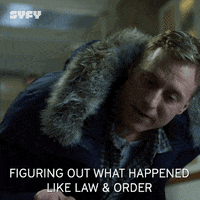The big news in the world of fantasy right now is a little Netflix show by the name of Shadow & Bone, based on Leigh Bardugo’s best-selling novels. I’ve only watched a few episodes so far, but it’s got me thinking a lot about book adaptations, specifically of the fantasy variety.
Everyone knows the book is always better than the movie. But with a recent spate of fantasy novel adaptations hitting both the big and little screens, directors and show-runners are putting that adage to the test.
It’s always both exciting and nerve-wracking to have your favorite series adapted for the screen. There’s a delicate balance between staying true to the source material and creating something that stands on its own. Who will be cast in the main roles? Will the author of the books be brought on as a consultant to the script? Will the ambience of the books translate to the screen? Sometimes an adaptation works wonderfully, existing as something both complementary to the source material and as its own new and beautiful piece of art. And sometimes…well, not so much.
Read on for my favorite book-to-screen adaptations (and a few that didn’t quite hit the mark).
Best—Good Omens
This BBC mini-series is based on an irreverent, hilarious take on the Book of Revelations co-written by Terry Pratchett and Neil Gaiman. I was skeptical anyone would be able to capture the tone and particular brand of humor contained in this book, but I was thrilled to be proven wrong. With on-point casting and a bomb script, this series had me laughing, crying, and wondering how soon was too soon to rewatch it.
Best—Witcher
Another Netflix show which released just over a year ago, Witcher is based on the books of Polish author Andrzej Sapkowski, and the video games which were also inspired by the books. Which is like…a Turducken of fantasy adaptations! Following the parallel stories of Geralt of Rivia, Princess Cirilla, and a sorceress named Yennefer, the show offers complex plot lines, tightly-choreographed action scenes, and just enough humor to keep me entertained (in the form of one hapless bard named Jaskier). I binged this in less than a week and couldn’t get the viral hit, “Toss a Coin to Your Witcher” out of my head for months.
Worst—City of Bones
The fandom surrounding Cassandra Clare’s Mortal Instruments series is massive. And rightly so—her books are famous for witty banter, forbidden romances, and sprawling casts of deeply drawn characters. Unfortunately, the movie adaptation of her first book didn’t really work for me. Despite a stacked cast—including Lily Collins, Lena Headey, and Jonathan Rhys Meyers—this movie felt bizarrely paced. With only two hours of runtime, the characters weren’t fully fleshed out, and many plot points seemed to come from left field. Definitely a case of a book being better than the movie.
Best—Shadowhunters
Bear with me—this TV show (airing on FreeForm) was based on the very same Cassandra Clare series as City of Bones. Although it took a few more liberties with the source material than the movie, this show was far better able to capture the breadth and tone of Clare’s series. With multiple episodes and seasons, both the main characters and side characters were able to have satisfying development arcs. The slow-burn romances were given time to develop, which made for better emotional pay-offs. Plot-points had time to play out. And although the supernatural effects sometimes seemed a little silly, it didn’t matter because I was so invested in the stories. Sometimes, a book adaptation needs longer than two hours to work.
Worst—the Hobbit
…And sometimes, it really doesn’t. Flush with success after the epic Lord of the Rings movies, Peter Jackson inexplicably decided to turn one of J. R. R. Tolkien’s shorter books into three movies, for a total of nine hours runtime! Where the book is a perfect balance of action and exposition, the movies are overstuffed with additional characters and unnecessary plot lines. Sometimes an adaptation feels like a labor of love…and sometimes it feels like a cash-cow.
Best—Stardust
Another Neil Gaiman adaptation! This movie follows a young man named Tristan who journeys into a strange otherworld in search of a fallen star. However, when he finds the star, he discovers she is in fact a beautiful woman—and he’s not the only one hunting for her. With a star-studded cast—Claire Danes, Robert DeNiro and Michelle Pfeiffer all have starring roles—and a beautiful, enchanting world, this movie is an absolute delight. While it does have some darker elements, in many ways it manages to capture the light-hearted, swashbuckling romance of classics like A Princess Bride and Ladyhawke. And yes, the chemistry between the two romantic leads is undeniable.
Best—The Magicians
So technically, I haven’t actually read Lev Grossman’s titular book series all the way through. But I love this Syfy show adaptation too much to leave it off the list. It’s like the grown-up, hallucinatory love-child of Harry Potter and Chronicles of Narnia. The story follows Quentin Coldwater after he’s accepted into the magical university of Brakebills, and discovers the magical kingdom of Fillory he read about as a child is not only real, but is home to a murderous, faceless Beast bent on controlling magic. With me so far? Good. Because with a well-drawn and diverse cast of characters, smart and snappy dialogue, fascinating magic systems, and original world-building, this show is everything. It reminds us, as readers and writers of fantasy, that magic is messy, dark, chaotic, and wonderful.
It also has numerous musical episodes. And fickle gods. And creepy faeries. And sentient ships. And bad-ass queens. And pocket timelines. And…okay, I’ll stop now. JUST WATCH IT, OKAY?
What fantasy book adaptations are your favorites? Or least favorites? Share you thoughts in the comment section below!








